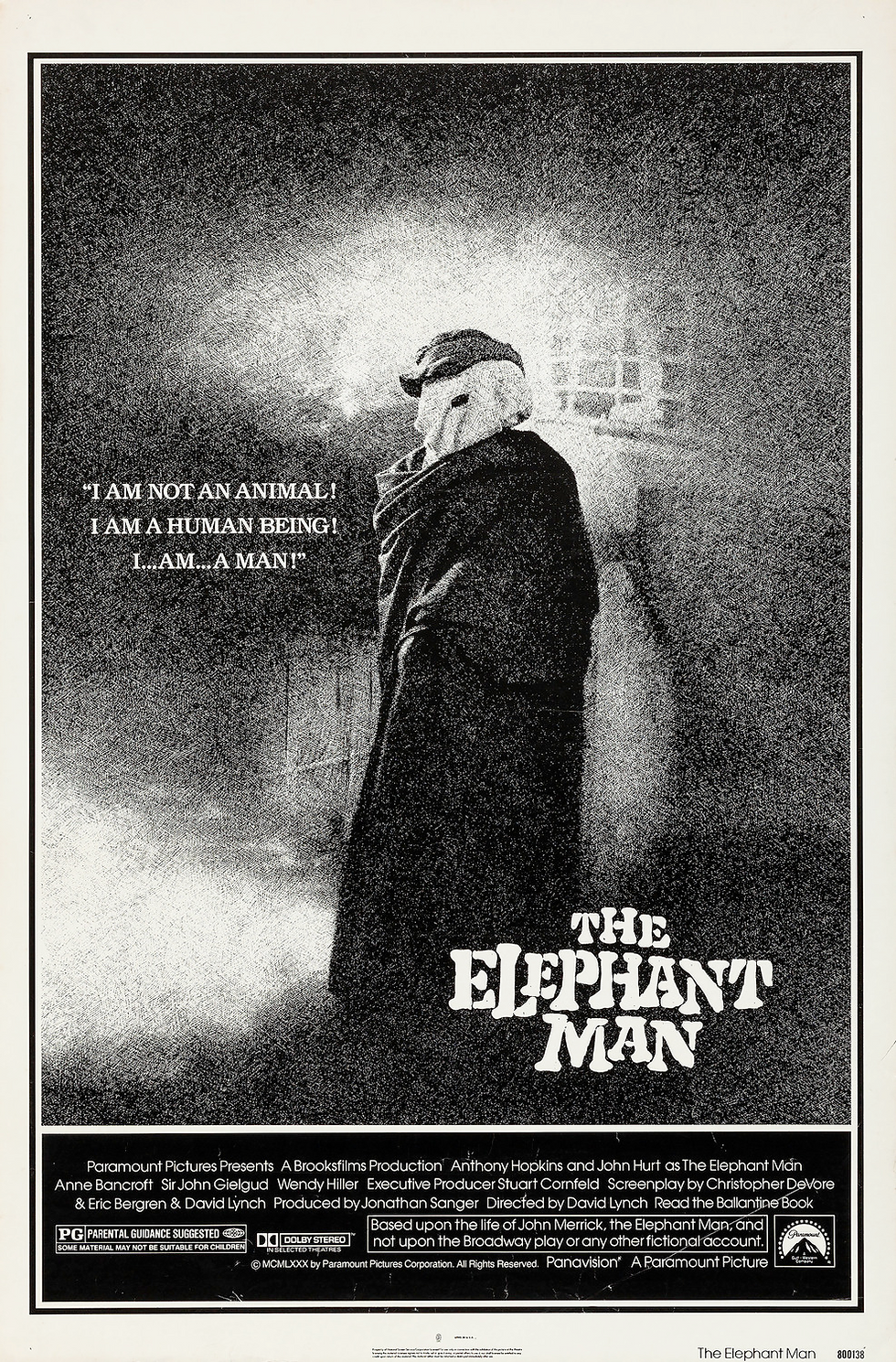The Elephant Man
- Jan 29, 2024
- 4 min read
Updated: Jan 31, 2024
David Lynch's first mainstream film after his midnight cult film, "Eraserhead", 1980's THE ELEPHANT MAN is a moving, powerful tale and our first major taste of the man as a legendary director.
There's no shortage of his unique style, including opening and closing scenes that confounded Roger Ebert at the time.
After the cryptic opening sequence featuring a screaming woman and slow moving shots of elephants, we are introduced to Victorian surgeon Dr. Frederick Trees. Trees is played by Anthony Hopkins (Magic, Silence of the Lambs) with perfect English mannerisms and speech, pulling us back to a time when medicine was on the cusp of becoming modern and class was everything within the fog of London.
Lynch shoots the entire film in black and white and some of the atmospheric scenes feel like actual footage of those days. You can almost smell the burning coal and feel the oil lamps.
Dr. Trees visits a traveling carnival, lurking through the freak show and about to meet the main attraction, The Elephant Man. Police close the show abruptly and the manager Bytes is told to hit the road. Bytes is played by the ever crazy Freddie Jones. A staple of the 80's in everything from "Firefox" to Lynch's "Dune", Jones is an absolute madman. Overacting in every moment, with strange line readings and emotions that seem disconnected from the dialogue, Jones is one of my least favorite screen actors of all time. Since Bytes is supposed to be vile and unlikable, it's probably Jones's best role. This guy is crazy.
Bytes gives Dr. Treeves a private showing of "his creature" and Treeves pays Bytes to bring him to the clinic the next day where he can examine him.
Treeves presents the Elephant Man to his colleagues the next day, in a somber scene that plays remarkably similar (save the laughs) to a scene in Mel Brooks "Young Frankenstein" six year before. Perhaps that not such a coincidence in that Mel Brooks produced this film and kept his name off of it, for fear that critics and moviegoers wouldn't take it seriously. Well done, Mel.
As Treeves grows to know the man, he discovers that he's John Merrick, 21 years old. Merrick has lived a life of unimaginable horrors. Merrick is played by John Hurt (Alien, Midnight Express) in a superb performance. Hurt is able to convey incredible emotion beneath the massive makeup work that covers his head and the majority of his body. The makeup took 8 hours a day to apply and two hours to remove, so Hurt only filmed every other day. The make up was created from plaster casts of the actual John Merrick.
Hopkins and Hurt are impactful in their many scenes together, packing an emotional wallop as Treeves discovers more and more beneath the disfigured shell of Merrick.
John Gielgud (Arthur, First Knight) is masterful as Carr Gomm, the head of the hospital in which Treeves is sheltering Merrick. Wendy Hiller (Murder on the Orient Express) is great as the head nurse who suffers no fools.
Anne Bancroft delivers as a famous stage actress who learns about Merrick in the London papers and wants to meet him. The scene in which the two read from "Romeo and Juliet" from the hardbound Shakespeare book she gifts him puts a lump in the throat.
Hannah Gordon (The Persuaders) also has star moments as Dr. Treeves wife, who's genuinely moved by Merrick and his plight when he comes to their home for tea.
A third act that rides dangerously off the rails due to far too much Freddie Jones, is quickly forgotten for the very satisfying finale.
Lynch is one of our most eclectic American directors. In this, his first big budget Hollywood film, he shows the unique fade-out editing and over-the-top storytelling choices that would become his trademark. Ebert called the final scene a mess, saying that "Merrick turns into the Star Child from 2001 or something" (which made me laugh).
Yes, Lynch chooses strange visuals at times, but they're always interesting. I did notice that he even managed to weave in that very annoying, constant white noise from "Eraserhead" into several key scenes. At least his methods always keep you watching and listening, wondering where he's going next.
I've been doing that with Lynch for the 44 years since this film hit theaters.
The film is a beautiful tribute to a man born into a horrible life for the majority of his existence. Some of the characters here that love to torment and parade him for their own amusement represent the very worst of man. Scenes of the worst of the lot abusing Merrick are very hard to endure.
Watching Treeves begin to wonder if he's starting to tread that same path of parading Merrick around the hospital is just one of the great moments within.
Hurt and Hopkins own Merrick and Treeves, diving deep into two characters that make us look at ourselves.
Lynch was rarely more mainstream than he was here. He would follow this up with his 1984 adaption of "Dune" that remains one of my favorite guilty pleasures to this day.
As for THE ELEPHANT MAN, it still packs a punch nearly 45 years after it's debut, earning an A-. Less Jones would have raised that grade considerably.
Nominated for 8 Academy Awards including Best Picture it won none, but surely would have won Best Makeup had that category existed at the time.













Comments